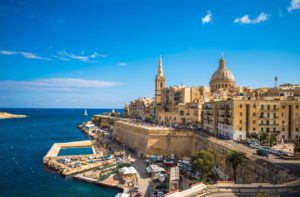The tiny island country has enacted model legislations to regulate blockchain, DLT, and cryptocurrencies:
 The Southern European island country of Malta, many may not know, is better known in the crypto world as the blockchain island. What is unique about the blockchain efforts in Malta is that the country is the first to have a regulatory environment for companies offering services in the field of blockchain and cryptocurrencies, providing legal sanctity for their activities and encouraging cooperation between cryptocurrency businesses and financial service institutions.
The Southern European island country of Malta, many may not know, is better known in the crypto world as the blockchain island. What is unique about the blockchain efforts in Malta is that the country is the first to have a regulatory environment for companies offering services in the field of blockchain and cryptocurrencies, providing legal sanctity for their activities and encouraging cooperation between cryptocurrency businesses and financial service institutions.
Malta already had the distinction of having licensed online gambling companies, and their activities making up a significant portion of the country’s GDP. It now aims to repeat this success with blockchain and crypto by offering a lucrative tax incentive system, government initiatives, and clear and friendly regulations. It was in July 2018, that the Parliament of Malta approved the regulatory framework for blockchain technology, making Malta one of the most blockchain-friendly countries in the world.
Realizing that serious entrepreneurs in the blockchain, cryptocurrency, and distributed ledger space needed legal certainty, the government pushed these bills into law, making the country clearly one of the most desirable locations for setting up blockchain enterprises that have incredible potential to build communities. That is how leading cryptocurrency exchanges like Binance and OKEx have made Malta their headquarters.
ACTS EXPLAINED
Of these laws, the Malta Digital Innovation Authority (MDIA) Act provides for the establishment of the regulator to be known as the MDIA. The MDIA approves Systems Auditors and certifies DLT platforms and smart contracts, which are referred to as technology arrangements.
Innovative Technology Arrangements and Services (ITAS) Act outlines a regime for the registration of Technology Service Providers, such as DLT platforms, and for the certification of Technology Arrangements such as smart contracts. The Virtual Financial Assets (VFA) Act sets out the framework for Initial Coin Offerings (ICOs) and the regulatory regime for the provision of certain services in relation to virtual assets.
Apart from MDIA, there is an overall regulator for financial services in the country – the Malta Financial Services Authority, which regulates the banking, investment, insurance, financial, pension companies, and securities markets in the country. In addition, Malta has a highly developed operational infrastructure to support innovative businesses.
In addition, there is the Malta Gaming Authority (MGA), which works hand in hand with the other 2 regulatory bodies. If blockchain technology and virtual currencies are being applied in a gaming context, the MGA will review the setup and provide final approval.
MANY CHALLENGES
However, there are questions about whether the country can face challenges galore as it positions itself to be the blockchain island. The challenges include retaining strong industry players who have or intend to relocate to Malta for purposes of making use of Malta’s regulatory framework and the immigration system that may have to take care of enterprises bringing in talent from outside the country. Malta does not have any unemployment problems for its local people but that may not continue when outside talent is brought in. As of now, the government has reviewed the process to allow non-Europeans to work in Malta to improve the efficiency with which such applications are duly processed to ensure that these meet the requirements of the industry.
The government believes that the new legal and regulatory framework has been able to create a strong foundation for the sector making its future bright. There are now plans for a regulatory sandbox, the development of a high-end incubation center, and concrete plans to attract venture capitalists and accelerators. The government is confident that these measures strengthen the overall ecosystem and attract the service clusters that are an integral part of a development strategy set for this sector.
RECENT SETBACKS
While these are bright spots, there was some setbacks too. As per a recent assessment, nearly 70% of companies in the sector have not sought licensing under various regulations and even 6 months after the deadline, just 26 companies have applied for licensing and none has been granted one. The MFSA is still reviewing these applications. It has also made its intentions clear about taking punitive measures against those who have not applied for the licenses. Curiously, companies that publicly supported the crypto legislation, like Binance and Palladium, have also not sought to license.
There were reports that some of these entities found the VFA Act requirements too demanding. For example, it is quoted that the licenses are too expensive – Euro 10,000 just to handle a preliminary VFA application. There are also complaints that the applicants have to adhere to Anti-Money Laundering and KYC policies under the VFA framework; there is also the EU’s Anti-money laundering (AMLD V) directive as well.
However, these do not make the achievements of the country anything insignificant. It is quite evident that while major economies were reluctant in regulating blockchain and cryptocurrencies, Malta adopted a remarkably progressive stance towards these systems and moved quickly to establish itself as an international blockchain hub.







